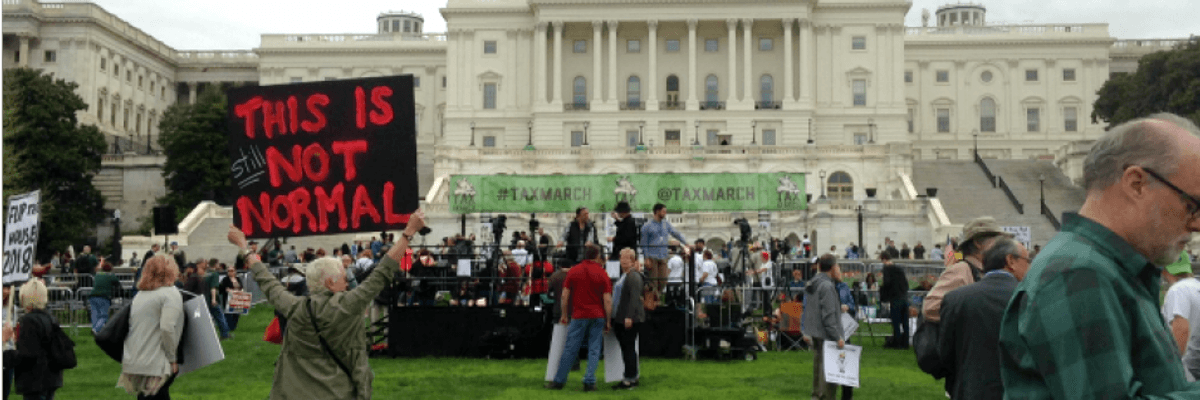
"To put that $4.4 million tax cut in perspective, it's about the same as the cost of Pell Grants for 1,100 low- and moderate-income students to help them afford college." (Photo: Megan Behm/Twitter)
Doubling Estate Tax Exemption Would Give Windfall to Heirs of Wealthiest Estates
Even today, only the largest 0.2 percent estates face the tax; the other 99.8 percent face no estate tax at all.
Senate Finance Committee Chairman Orrin Hatch's new tax bill would double the value of estates that's exempt from the estate tax, from $11 million per couple ($5.5 million per person) to $22 million per couple ($11 million per person). That would:
Cut the share of estates facing the tax from 2 in 1,000 to fewer than 1 in 1,000. Even today, only the largest 0.2 percent estates face the tax; the other 99.8 percent face no estate tax at all. Policymakers have dramatically raised the exemption level in recent decades (from $675,000 per person in 2001), so far fewer estates are large enough to be taxable. (See first chart.)
Doubling the exemption level would reduce the share of estates facing the tax from 0.2 percent to 0.07 percent, leaving only 1,800 estates nationwide facing the tax, estimates from the Joint Committee on Taxation and Tax Policy Center show. (See second chart.)
Give each of the 1,800 very largest estates a tax cut of $4.4 million per couple. Doubling the exemption would eliminate the estate tax for estates worth between $11 million and $22 million per couple, and would give estates worth over $22 million per couple (all those left facing the tax) a tax cut of $4.4 million apiece -- 40 percent of the additional $11 million in assets that would be exempt. That's because the 40 percent statutory estate tax rate applies only to amounts above the exemption level.
To put that $4.4 million tax cut in perspective, it's about the same as the cost of Pell Grants for 1,100 low- and moderate-income students to help them afford college. (See third chart.)
An Urgent Message From Our Co-Founder
Dear Common Dreams reader, The U.S. is on a fast track to authoritarianism like nothing I've ever seen. Meanwhile, corporate news outlets are utterly capitulating to Trump, twisting their coverage to avoid drawing his ire while lining up to stuff cash in his pockets. That's why I believe that Common Dreams is doing the best and most consequential reporting that we've ever done. Our small but mighty team is a progressive reporting powerhouse, covering the news every day that the corporate media never will. Our mission has always been simple: To inform. To inspire. And to ignite change for the common good. Now here's the key piece that I want all our readers to understand: None of this would be possible without your financial support. That's not just some fundraising cliche. It's the absolute and literal truth. We don't accept corporate advertising and never will. We don't have a paywall because we don't think people should be blocked from critical news based on their ability to pay. Everything we do is funded by the donations of readers like you. Will you donate now to help power the nonprofit, independent reporting of Common Dreams? Thank you for being a vital member of our community. Together, we can keep independent journalism alive when it’s needed most. - Craig Brown, Co-founder |
Senate Finance Committee Chairman Orrin Hatch's new tax bill would double the value of estates that's exempt from the estate tax, from $11 million per couple ($5.5 million per person) to $22 million per couple ($11 million per person). That would:
Cut the share of estates facing the tax from 2 in 1,000 to fewer than 1 in 1,000. Even today, only the largest 0.2 percent estates face the tax; the other 99.8 percent face no estate tax at all. Policymakers have dramatically raised the exemption level in recent decades (from $675,000 per person in 2001), so far fewer estates are large enough to be taxable. (See first chart.)
Doubling the exemption level would reduce the share of estates facing the tax from 0.2 percent to 0.07 percent, leaving only 1,800 estates nationwide facing the tax, estimates from the Joint Committee on Taxation and Tax Policy Center show. (See second chart.)
Give each of the 1,800 very largest estates a tax cut of $4.4 million per couple. Doubling the exemption would eliminate the estate tax for estates worth between $11 million and $22 million per couple, and would give estates worth over $22 million per couple (all those left facing the tax) a tax cut of $4.4 million apiece -- 40 percent of the additional $11 million in assets that would be exempt. That's because the 40 percent statutory estate tax rate applies only to amounts above the exemption level.
To put that $4.4 million tax cut in perspective, it's about the same as the cost of Pell Grants for 1,100 low- and moderate-income students to help them afford college. (See third chart.)
Senate Finance Committee Chairman Orrin Hatch's new tax bill would double the value of estates that's exempt from the estate tax, from $11 million per couple ($5.5 million per person) to $22 million per couple ($11 million per person). That would:
Cut the share of estates facing the tax from 2 in 1,000 to fewer than 1 in 1,000. Even today, only the largest 0.2 percent estates face the tax; the other 99.8 percent face no estate tax at all. Policymakers have dramatically raised the exemption level in recent decades (from $675,000 per person in 2001), so far fewer estates are large enough to be taxable. (See first chart.)
Doubling the exemption level would reduce the share of estates facing the tax from 0.2 percent to 0.07 percent, leaving only 1,800 estates nationwide facing the tax, estimates from the Joint Committee on Taxation and Tax Policy Center show. (See second chart.)
Give each of the 1,800 very largest estates a tax cut of $4.4 million per couple. Doubling the exemption would eliminate the estate tax for estates worth between $11 million and $22 million per couple, and would give estates worth over $22 million per couple (all those left facing the tax) a tax cut of $4.4 million apiece -- 40 percent of the additional $11 million in assets that would be exempt. That's because the 40 percent statutory estate tax rate applies only to amounts above the exemption level.
To put that $4.4 million tax cut in perspective, it's about the same as the cost of Pell Grants for 1,100 low- and moderate-income students to help them afford college. (See third chart.)


